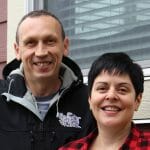After just three years in business, Bella Guest Cabins found a demand for more accommodations in Bella Bella and decided to expand. Owners Cliff and Ramona Starr attribute their success to careful market research, detailed planning, and receiving the support of the Haíɫzaqv (Heiltsuk) Nation.
Bella Guest Cabins: The Growth of Small Business in Haíɫzaqv Territory
Estimated Reading time

32 Mins
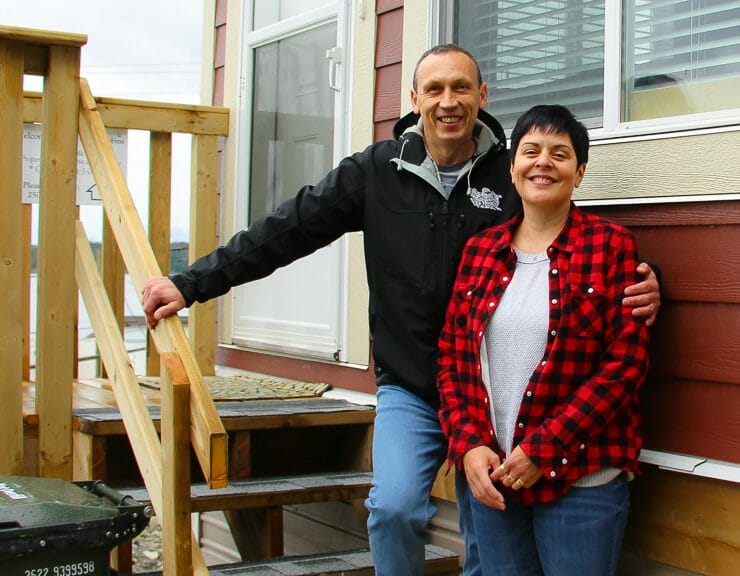
Bella Guest Cabins overlooks Lama Pass, located in the Haíɫzaqv community of Bella Bella on Campbell Island.
At a Glance
For years Cliff and Ramona Starr knew they wanted to own a small business in their community of Bella Bella. Years of careful market research, detailed business planning, and tireless fundraising paid off: in 2014, the Starrs opened Bella Guest Cabins. Three years later, their business had reached a point where they were able to expand by adding a third self-contained suite, with the support of Coast Funds.
Though it is one of the few accommodation businesses in Haíɫzaqv (Heiltsuk) territory, the Starrs’ business is part of a growing Indigenous small business economy in BC. And at home, the cabins are playing a role in diversifying the economy in Bella Bella by capturing a growing ecotourism industry, and referring visitors to other local businesses.
The Rise of Indigenous Entrepreneurs
Starting a small business is an immense undertaking under the simplest circumstances. An entrepreneur faces the stress of fundraising, forecasting, managing cash flow, and spending significant time away from family and friends.
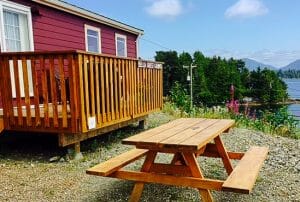
But starting a small business on a First Nations reserve means overcoming a number of unique barriers: finding available property to build and open a business; getting the support of band council, local businesses, and community members; and locating an accountant who understands First Nations business taxes are just a few of the challenges faced by Indigenous entrepreneurs.
In spite of those barriers, Cliff and Ramona Starr have found success with their small accommodation business. Perhaps it speaks to a fortitude of focus, determination, and patience, or perhaps it’s just that age-old instinct akin to every living being on the planet: find a niche and excel in it.
For years the Starrs knew they wanted to start a small business, but they waited until they found their niche. “We talked a lot about starting our own business over the years,” says Cliff Starr. “It was just a matter of figuring out what business would give us an opportunity to earn a decent income.”
We talked a lot about starting our own business over the years. It was just a matter of figuring out what business would give us an opportunity to earn a decent income.
The Starrs own and operate Bella Guest Cabins: three self-contained suites overlooking beautiful Lama Passage, in the Haíɫzaqv (Heiltsuk) community of Bella Bella. “We have taken great pride in making this a friendly place to stay that is cozy, comfortable, and tastefully decorated,” the Bella Guest Cabins website announces to prospective visitors. “The spacious decks boast a fantastic place to enjoy your morning coffee, and watch the eagles soar and ocean waves come in.”
In fact, their success is not so unique. Indigenous entrepreneurs across BC have seen major successes in recent years. A 2018 survey indicates that despite facing barriers to success, over 90 per cent of Indigenous business owners say their operations have been successful to-date.
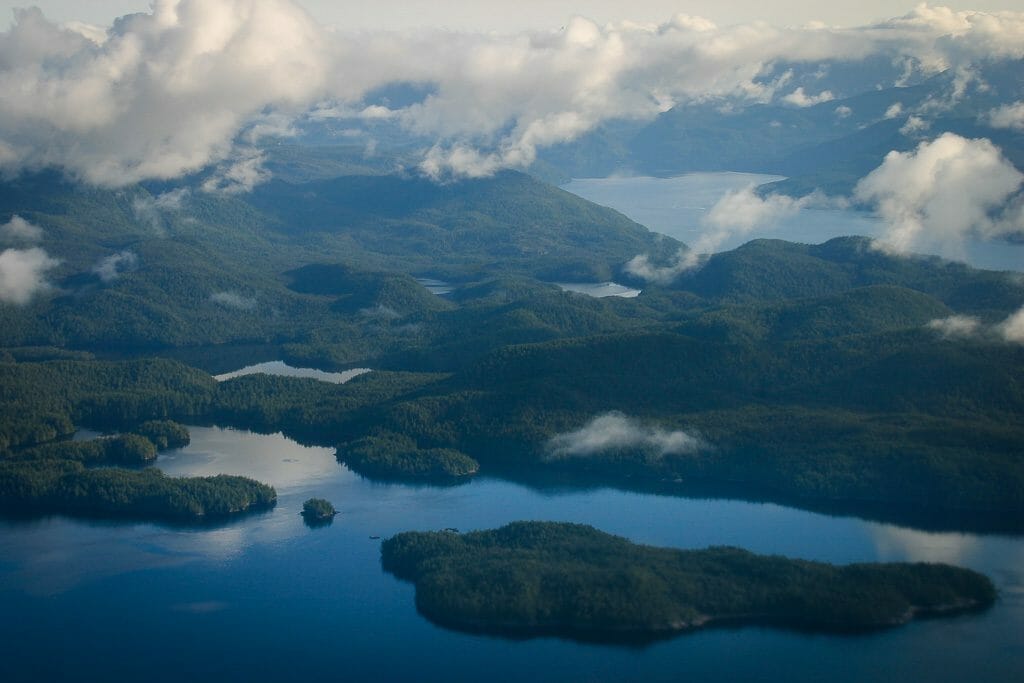
Haíɫzaqv territory spans 1.5 million hectares from the southern tip of Calvert Island, up Dean and Burke Channels as far as Kimsquit and the head of Dean Inlet to the northeast, and up the Mathieson and Finlayson Channels to the north. Photo by Coast Funds.
Business in Haíɫzaqv Territory
The Haíɫzaqv are descendants of the Hailhzaqvla-speaking peoples of the central coast of what is now generally known as British Columbia. Their territory spans 1.5 million hectares from the southern tip of Calvert Island, up Dean and Burke Channels as far as Kimsquit and the head of Dean Inlet to the northeast, and up the Mathieson and Finlayson Channels to the north.
For thousands of years they have been successful traders and entrepreneurs. Prior to colonization the Haíɫzaqv “maintained extensive networks of sharing, redistribution, and trading relationships that united the Heiltsuk groups and included other groups up and down the coast,” states the Heiltsuk Cultural Education Centre.
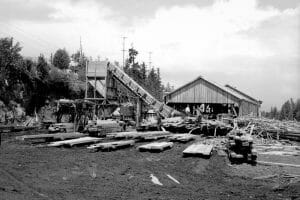
The Haíɫzaqv resisted colonization, but it still had devastating impacts on Haíɫzaqv ways of living. A smallpox epidemic wiped out a number of villages completely and survivors from the five Hailhzaqvla-speaking groups amalgamated at ’Qélc (then called Bella Bella by Europeans) before relocating to Wáglísla which became known as New Bella Bella.
Within a decade Bella Bella was the second largest community on the coast, and a thriving centre of trade and shipping. But though it was Haíɫzaqv resources being traded and shipped, so few of the benefits returned to the community and its people. Haíɫzaqv leadership attended the Royal Commission on Indian Affairs for BC in 1913 to express their concern that the economic future of their children was at risk; their land and fishing and hunting rights were being given to others for their own profit. At those hearings Nukva (Charles Windsor) stated:
“We have a reserve but there is none of it fit for cultivation. We are satisfied with the reserve for living purposes, but we would like to have the free use of the surrounding land for the purposes of logging and fishing and to have all the hunting privileges on it. We are afraid that later on we will have no way to make any money, and we would like to have these villages reserved to us now. Our children are growing up now and they will have no way to make their living.” (Learn more about Haíɫzaqv history here and here.)
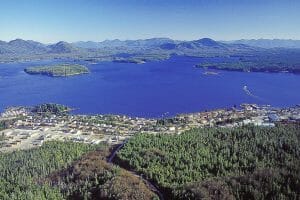
By the mid-to-late 1900s, the fishing and logging industries began to collapse, and nearby communities became ghost towns. The Haíɫzaqv and the village of Bella Bella suffered similarly: unemployment was high and economic opportunities were limited. But Haíɫzaqv leadership, as it had since the time of contact, wasn’t sitting back and accepting the status quo. As one of many approaches to economic revitalization, Haíɫzaqv were leaders in negotiating the Great Bear Rainforest agreements, and securing a significant amount of conservation finance that formed Coast Funds in 2007.
Today, the Haíɫzaqv leadership is uplifting its citizens and strengthening well-being throughout the community of Bella Bella. Community members are returning to Bella Bella to grow and diversify the local economy. The Starrs are two such returnees. After spending 11 years in Nanaimo studying business at what is now Vancouver Island University, they returned to Bella Bella knowing they wanted to be a part of growing the new Haíɫzaqv economy.
Identifying Their Niche
Cliff Starr says he knew for years that he wanted to run a small business; it’s the reason he went to Nanaimo to pursue his education—a diploma in business management, and a bachelor’s degree in commerce. Ramona Starr, who studied computer support, accounting, and new enterprise management, shared his interest.
Upon returning to Bella Bella, the Starrs recognized a gap in the hospitality industry in their home community. There were a few local B&Bs—like Alvina’s B&B, Annette’s Beach House, and Rainforest Suites —and the Shearwater Resort on the nearby Denny Island. But since the 1980s—when the Bella Bella Hotel closed down following the collapse of the fishing industry—there remained a strong demand for accommodations in the small town.
Filling that gap in accommodation demand would mean being able to capitalize on the high levels of tourism traffic coming through Haíɫzaqv territory during the summer months. Through market research, the Starrs found that during peak tourist season more than 11,000 visitors come through the Bella Bella airport. At the time, the vast majority of those visitors were being transported directly to their final destinations and bypassing the community, while others might stay at the Shearwater Resort, missing the opportunity to stay—and spend essential tourist dollars—in Bella Bella.
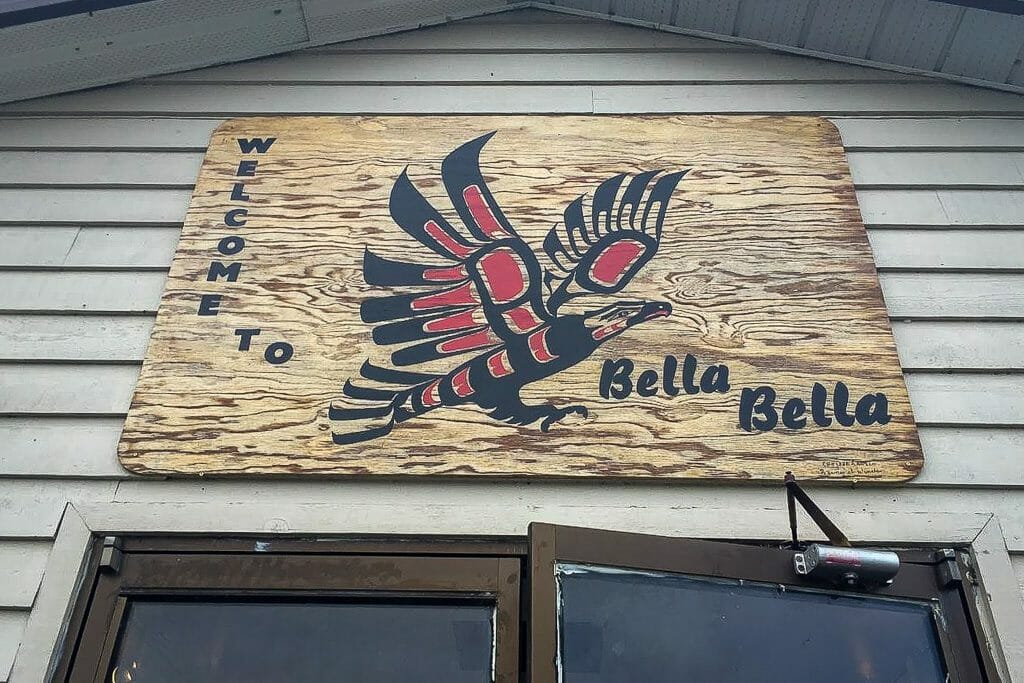
And those visitors do have money to spend. A 2018 report from Indigenous Tourism BC shows that customers spend more than $700 million each year on the province’s 401 Indigenous tourism businesses.
K̓áwáziɫ Marilyn Slett, Chief Councillor of the Heiltsuk Tribal Council, says one of the Nation’s economic development goals is to develop their tourism industry and opportunities for Haíɫzaqv members to participate in. “One of the reasons, and one of the things that we’ve looked at with tourism, is for the most part it’s non-extractive,” says K̓áwáziɫ. “It’s something that is very sustainable for us.”
One of the reasons, and one of the things that we’ve looked at with tourism, is for the most part it’s non-extractive. It’s something that is very sustainable for us.
The Starr’s had found their niche and knew they wanted to be one of those successful tourism businesses. Cliff and Ramona began working on their business plan in 2009 and would spend the next five years raising the necessary capital, finding a suitable space to build, and working with others to improve their business plan.
As part of the Nation’s plan to develop tourism in the region it made sense to support a local accommodation business like Bella Guest Cabins. The Starrs gained support from a few of the Heiltsuk Band Councillors at the time. Medric Reid and Maria Martin championed their plan and brought it to the Band Council table to allocate a lot and obtain a Band Council Resolution in support of this opportunity. The councillors support pushed their plan, helping it become a reality.
Medric Reid recalls seeing the importance of supporting the project at the council level if the Nation wanted to diversify and strengthen its economy. “Without our Nation having a community development society or an agency that would allow entrepreneurs to advance forward, I felt it was important that we create the opportunities for folks by supporting their business,” he says. “I was happy to bring that to the Nation and to help address the lack of accommodations and no hotel in our community.”
The Starrs also received significant support from local businesses and community members. “We obtained numerous letters of support from various business that use our services,” says Ramona.
I felt it was important for us to foster entrepreneurship, because…we needed entrepreneurs and small businesses to have a healthy economy.
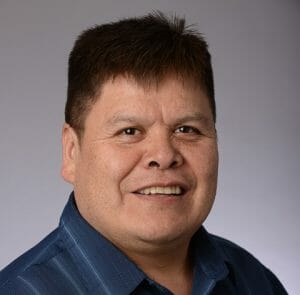
The Starrs timing also coincided with a push from the Heiltsuk Economic Development Corporation (HEDC) to support the growth of entrepreneurs in Bella Bella. Ğṇísḷağy̓ḷís Gary Wilson, a Haíɫzaqv member and former general manager of HEDC, recalls: “I felt it was important for us to foster entrepreneurship, because I felt HEDC was kind of an organization that would help to develop and manage existing opportunities and develop new and larger opportunities at the Nation level, but we needed entrepreneurs and small businesses to have a healthy economy.”
Cliff and Ramona’s business plan reflected this big picture thinking with a focus on how their business could support the growth of the community. They wrote: “It is imperative to the local economy that we take advantage of the growing trend toward ecotourism to build Bella Bella and the central coast as a desirable holiday destination and, in turn, create new employment opportunities, as well as, a secondary benefit of more potential customers for the local merchants.”
Accommodation, the Starrs point out, is a cornerstone of the tourism business. “We cannot entice vacationers to come to Bella Bella if they cannot find accommodations while they are here in the community.”
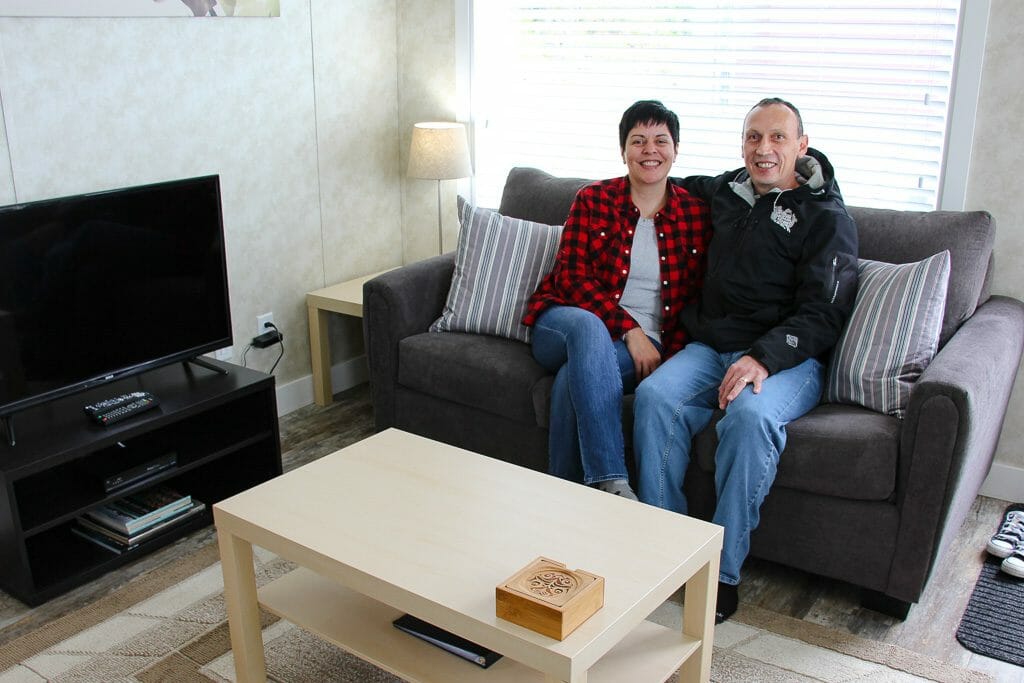
Taking the First Steps: Overcoming Unique Barriers
When people approach Ğṇísḷağy̓ḷís Gary Wilson saying they want to start a business he always tells them to “Give it some thought.” He’s not trying to scare away new entrepreneurs, but encouraging them to slow down and do their research. Cliff and Ramona, he says, did just that. “When Cliff came to me and asked for a letter support from HEDC—to provide support letter for them to access funds from Coast Funds and other sources—I said definitely, pleased to do that.”
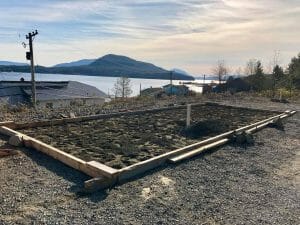
Even with the support of their Nation, building a business on a First Nations reserve held additional challenges for Cliff and Ramona. Cliff points out that many reserves have limited commercially developed property that isn’t already designated for residential buildings. “It was definitely a challenge,” says Cliff. They approached owners of a number of vacant lots but the selling prices were too high. Eventually, they were able to find a lot that was less desirable for residential because of its size and steep driveway.
Despite the challenges, Cliff and Ramona succeeded in achieving their dream of owning and operating their own small business. Bella Guest Cabins turned back its covers and welcomed the public in February 2014. When they first opened, the business consisted of two self-contained units offering “all the comforts of home.”
Ramona runs the cabins full-time, doing everything from reservations, marketing, website design, accounting and housekeeping.
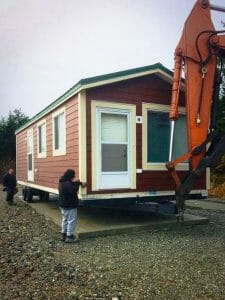
As predicted, the cabins quickly captured much of the overflow accommodations market. During the spring and summer months, both cabins were at 85 to 100 per cent occupancy, dropping only slightly to 60 to 70 per cent in the off-season. Reviews were positive and Bella Guest cabins quickly earned several repeat customers.
The majority of those customers, as expected, are guests to the Haíɫzaqv territories. “I think the majority of our guests that come in right through the end of September are mostly tourists,” says Ramona. “We’re such a hub for the Great Bear Rainforest” – and people are constantly travelling through. But, over the last couple of years we noticed a trend of tourists coming just to see Haíɫzaqv territory. “There’s guests from all over the world – New Zealand, England, Germany, Australia… we are not exactly sure how they even find us here in Bella Bella” says Ramona.
There’s also a number of guests that come to do business in Bella Bella, many of who prefer to stay in the community. “The band is so busy with different governmental people and there’s always a project going on and different people coming in and out,” points out Ramona. “We do have a lot of repeat customers that will come back with us.”
They even get Haíɫzaqv members staying with them when there’s an event in town like a potlach, wedding, or funeral. Ğṇísḷağy̓ḷís, who now lives in Nanaimo, says he often stays at Bella Guest Cabins when he returns home. “In fact, I’m going to be going up there for my brother’s wedding, I’m going to be staying up there. They’re an excellent service, an excellent accommodation for people.”
Often, the cabins are so popular that Ramona has to refer visitors to the other local B&Bs. “and they do the same for us,” she says. Between March and September in 2015, Bella Guest Cabins referred over 230 people to other local accommodations. After that season, the Starrs knew it was time to scale up.
It’s very exciting to see small businesses like that grow and to be able to support an economy like ours.
In 2016, Cliff and Ramona began planning to expand their business by adding an additional cabin. With support from the Heiltsuk Tribal Council, Bella Guest Cabins was able to access economic development funding through Coast Funds. They also connected with TriCorp, New Relationship Trust, Bank of Montreal for a Business Line of Credit for additional loan funding.
The third cabin was bought from Gordon Homes in Nanaimo and barged up to Bella Bella in fall of 2017. By the start of 2018, the new cabin was open for business. Right away the expansion benefited the small business. Bella Guest Cabins reported at 35 per cent increase in revenue in the 2018 season which helped relieve some of the burden of paying off three business loans.
“It’s been exciting to see how they have done it in phases and they’ve been able to be very successful in having a large client base,” says Medric Reid. “It’s very exciting to see small businesses like that grow and to be able to support an economy like ours.”
Lessons Learned and Overcoming Challenges
Today, when he looks at the economy in Bella Bella, Ğṇísḷağy̓ḷís Gary Wilson sees room for growth. “I think there’s still opportunity there,” he says. “There’s room to build.”
Chief Councillor K̓áwáziɫ Marilyn Slett has seen changes over the past years. She points to a number of entrepreneurial programs supported by the Nation and says there is a lot of energy and drive from the Haíɫzaqv members who have participated. “Each and every one of the students—band members that participated—has a vision of retail, tourism, accommodations, their vision of providing their own self-employment opportunities,” says K̓áwáziɫ.
So how can an Indigenous entrepreneur get started in Bella Bella, or any other remote First Nations community? Ğṇísḷağy̓ḷís and Cliff and Ramona Starr have offered the following lessons for those aspiring to start their own small business:
Start Slow
Both Cliff Starr and Ğṇísḷağy̓ḷís suggest entrepreneurial hopefuls take their time in getting started. Do your research, find out what niches need to be filled in your community’s economic development, make connections. “Be very, very patient,” says Cliff. “Things take a long, long time to move forward on a reserve.”

Ğṇísḷağy̓ḷís points to his cousin Carey Windsor, who owns Aftershocks Coffee House at the Bella Bella airport. Even after Windsor knew he wanted to open a coffee business, he took a year to work at a major coffee chain to learn all he could from a successful business. “I can’t underscore that enough,” says Ğṇísḷağy̓ḷís. “Most people just jump into an opportunity.”
Cliff Starr points out that taking your time allows a new entrepreneur to secure their financing before getting started. “We started the business plan in 2009 and we opened doors in 2014, so it took that long to get loans, to obtain property in the community to build on, and to get a band council resolution from tribal council to support the application.”
He also suggests having a backup plan while sourcing financing—an alternative source of income while getting started: “Ramona and I were lucky that I was still working when we started the business and things were just starting to get going, it was a couple years before we really started to pick up some traction.”
Ask for Help
Both the Starrs and Ğṇísḷağy̓ḷís point out the necessity of reaching out for support when establishing a small business. Finding community resources designed to help small business start-ups can make a big difference in giving an entrepreneur a head start.
“Ask for help!” says Cliff Starr. “Just really do your investigative work where you can.” Outside of organizations, entrepreneurs might be able to find help within their own network. The Starrs suggest reaching out to other business owners, saying they get similar requests frequently. “There’s always people who ask us if we can help them with their business plans.”
During the first year of operating their business, Ramona found support through the Self-Employment Program and Community Futures Mount Waddington. She was able to access online business webinars and received ongoing support and advice for the business.
Build a Network of Experts

Part of asking for help is building a network of qualified experts to support your business, says Ğṇísḷağy̓ḷís. “All these other partners like your lawyer, your accountant, your bookkeeper, your bank – all these people that will help you succeed. Not a lot of entrepreneurs think along those lines,” he says. “I see Cliff and Ramona as an example of somebody who probably took that advice and accepted it.”
Even though Cliff and Ramona worked to build their support network, they still struggled to find experts who understood the nuance of First Nations business-ownership. Even filing taxes proved an additional challenge for Cliff and Ramona. Finding an accounting business with an understanding of First Nations’ business taxes on reserve was not easy – and something that we are still working on. It’s such a convoluted grey-area—with being First Nations and having your business on reserve. There’s so many people that don’t know the logistics – and it has been a very difficult time.
All these other partners like your lawyer, your accountant, your bookkeeper, your bank – all these people that will help you succeed.
Pay Attention to the Details
The success of a small business comes from paying attention to small details, whether that’s in a contract, on a balance sheet, or during tax season.
Ğṇísḷağy̓ḷís suggests that too often, a new entrepreneur might look at their year-end earnings and see a positive and think they’ve succeeded. He notes that they should be looking through their whole balance sheet to see where are their risks, where can they minimize costs, and where are their opportunities to scale.
For Ramona Starr, paying attention to the details means ensuring each cabin is cleaned and maintained to her high personal standards. “I still do my own cleaning because I’m very particular.” Beyond cleaning, she and Cliff work to ensure each unit is maintained well, and she thinks that attention to detail shows in their success. “That’s one of the things is to be really dedicated and passionate about what you’re doing. That really shows through,” says Ramona. Her guests, it seems, would agree. “We have comment books in all of our cabins. We have wonderful comments in those books as well as on our website—we’re always happy to know that our guests have enjoyed their stay.”
Economic Outcomes
The development and growth of Bella Guest Cabins has had positive economic impacts for the community of Bella Bella. As foreseen in the Starrs’ business plan, the cabins help capture the many ecotourism visitors that come through the community, thus leading to a more sustainable and diverse economy in the region.
Cliff and Ramona do their best to encourage guests to visit other local businesses, thus further bolstering the local economy. Their website and guest directory refers guests to local guides, for example, if they want to get out and fish or tour the region. “We have a whole guest directory set up in the cabins,” says Ramona. “We refer people to, Carey [Aftershocks Coffee] at the airport, Waglisla Band Store and Bakery, Koeye Gift Shop, and Shearwater. We like to help everybody out.”
That, says Ğṇísḷağy̓ḷís will go a long way in strengthening the local economy. “There’s a theory that in order for a community to be self-sustaining,” he says, “the dollar has to revolve seven times in a community.”
Medric Reid says Bella Guest Cabins has kickstarted a greater interest in small business within the community. “There has been a handful of other community members who have expressed an interest in wanting to pursue small business opportunities,” he notes. “It was an excellent opportunity to start to establish these different opportunities [like Bella Guest Cabins]. Not only for our membership but for our Nation as a whole.”
Social Outcomes
The expansion of Bella Guest Cabins in 2017 led to the creation of seven temporary construction jobs in Bella Bella. Additionally, permanent employment created include Ramona’s full-time position operating the business, Cliff’s part-time role maintaining the buildings, and a part-time seasonal housekeeping position fulfilled by the Starrs’ daughter Kelsie. “And we have another daughter that we’re grooming,” laughs Ramona. “She’s 12.”
Another family member is a major source of support as well. Ramona’s father, John Waterfall, is the former head of maintainance for RW Large Memorial Hospital. “He’s a wealth of knowledge and experience,” says Cliff. “He’s called upon to troubleshoot issues that arise from time to time at the cabins.”
Cultural Outcomes
Cliff and Ramona’s business provides cultural benefit to the community by providing a place for out-of-town Haíɫzaqv members to stay when they are returning home. This gives Haíɫzaqv members a greater ability to visit their community and participate in cultural events like potlatches and the upcoming grand opening of the Haíɫzaqv big house.
Ramona sees the importance of supporting people from the community. “Haíɫzaqv means to speak and act correctly. Bella Guest Cabins honors that and we always try to help out those in need of accommodations.”
In 2016, Coast Economic Development Society approved $50,000 to expand Bella Guest Cabins from two to three cabins to support tourism and accommodations capacity in Bella Bella.
Online Resources
- Haíɫzaqv (Heiltsuk) Nation
Haíɫzaqv (Heiltsuk) Nation website - Heiltsuk Economic Development Corporation
Heiltsuk Economic Development Corporation website - First Peoples, First Business
Indigenous Entrepreneurs and Reconciliation in BC, Dec 2018 - Heiltsuk Cultural Education Centre
Historical Notes on Bella Bella Heiltsuk - Great Bear Rainforest
History of Great Bear Rainforest Agreements and Coast Funds - HEDC Businesses and Services
Accommodation Businesses in Bella Bella - Annette’s Beach House
Local Accommodation in Bella Bella - Shearwater Resort and Marina
Accommodation Near Bella Bella - “The Next Phase” Tourism Performance Audit Report 2012-2017
Indigenous Tourism BC, March 2018 - TriCorp
Tribal Resources Investment Corporation - New Relationship Trust
New Relationship Trust - Community Futures
Community Futures - Aftershocks Coffee House
Aftershocks Coffee House Facebook
Published On April 26, 2019 | Edited On March 3, 2026

